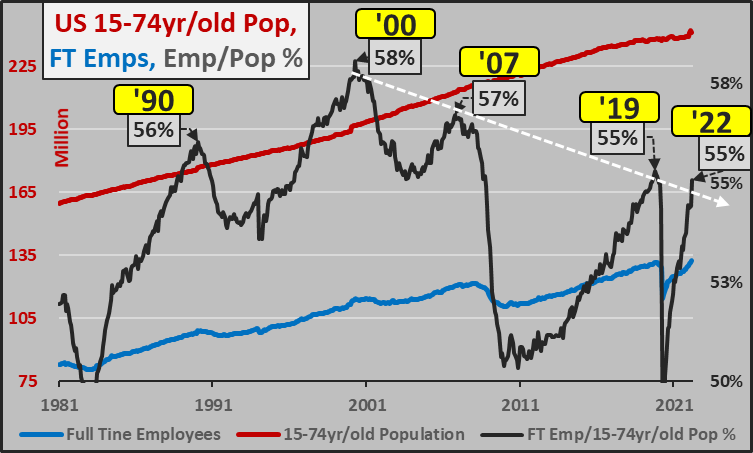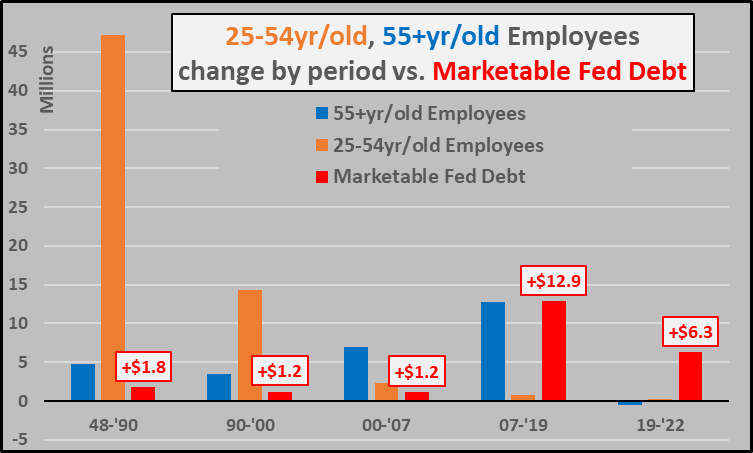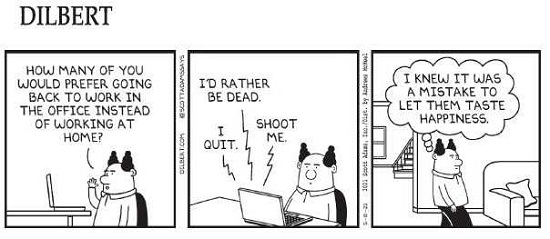What happens when the workforce no longer wants to work? We're about to find out. As with all cultural sea changes, macro statistics don't tell the full story. The sea change is better illuminated by anecdotal evidence: workers constantly quitting to take better jobs; zero loyalty to corporate employers; workers cutting hours from full-time to part-time; workers going out for lunch and never coming back; workers giving up on selling sugar-water for the rest of their lives (echoing Steve Jobs' famous challenge to John Scully: "Do you want to sell sugared water for the rest of your life? Or do you want to come with me and change the world?") and giving up on owning an insanely over-valued house.
Workers may sell sugar-water but their hearts are no longer in it. Some are interested in changing the world, and others are interested in changing their own lives as the means to change the world.
Numerous articles have been published describing these cultural changes in values and expectations: here are three:
From the Great Resignation to Lying Flat, Workers Are Opting Out: In China, the U.S., Japan, and Germany, younger generations are rethinking the pursuit of wealth.
'We are the last generation': China's youth rallied around a now-censored social media hashtag to rage about their disillusionment with life and disdain at draconian lockdowns
The rise of 'bai lan': why China's frustrated youth are ready to 'let it rot'
Note that this cultural shift is global. The dynamics of the global economy are similar the world over: capital has garnered most of the gains of the past generation, leaving shards for labor; the "good things in life" such as owning a house and nice vehicle have soared out of reach of all but the top 10% of households; youth were implicitly promised "good paying jobs and fulfilling careers" if they went to university, and then they graduate into a global economy of dead-end jobs and cut-throat competition for the few slots at the top of the constantly eroding sand pile.
The global lockdown revealed several great truths to many idled workers: 1) I'm wasting my life slaving away for an employer to whom I am disposable; 2) trying to own the upper-middle class lifestyle is not worth the sacrifices required, and 3) there are ways to work less and still get by, and live a better life doing so.
Once the rats are no longer interested in the rewards because they're out of reach, they jump off the wheel. Once the tax donkeys flop down in exhaustion and ask why they're working so hard to pay outrageous taxes and fees, they lose interest in carrying their heavy load ever again. When debt-serfs stop and calculate their chances to pay off their debt and reach upper-middle class Nirvana, they bail on the entire project.
People found they could get by on much less than they previously reckoned. Some found niches in the informal or gig economies, others secured a quasi-pension in the social-welfare system, others decided that net-net of expenses, they were better off quitting and staying home to care for the kids rather than pay thousands of dollars in higher taxes and childcare fees for the privilege of busting their derrieres on an endless treadmill.
People realized they wanted a career and worklife they defined and controlled rather than one defined and controlled by an employer. I outline accrediting yourself and other aspects of this in my book Get A Job, Build a Real Career and Defy a Bewildering Economy. (sample chapter here)
Some people awakened to the practicality of micro-homes and small home-based enterprises. They realized they didn't have to sign on to a lifetime of labor as tax donkeys and debt-serfs.
Employers are struggling to adapt to this cultural transition. Those demanding employees go back to the good old days are like dinosaurs expecting the meteor-strike's effects to dissipate in a few days.
The fantasies of fully automated whatever have been revealed as unrealistic. As with all such techno-fantasies, the proponents are never experts in the field being touted as the solution. Automation has limits. Robots break down, need to be reprogrammed, and need human co-workers (so-called cobots). Enthusiasts naively believed that because something is technically possible, that it automatically becomes financially viable. This is an entirely different proposition.
How this all plays out is an open question. The Powers That Be don't approve, for obvious reasons: who's going to do all the work to enable our lavish lifestyles and gargantuan gains?
Workers are voting with their feet, and that's difficult to control. When values and expectations change, everything else eventually changes, too.



Recent podcasts/videos:
The Big Problems And Crash Dynamics Of The Spring/Summer 2022 Housing Market Crisis, Simplified (1:08 hr)
My new book is now available at a 10% discount this month: When You Can't Go On: Burnout, Reckoning and Renewal.
If you found value in this content, please join me in seeking solutions by becoming a $1/month patron of my work via patreon.com.
My recent books:
Global Crisis, National Renewal: A (Revolutionary) Grand Strategy for the United States (Kindle $9.95, print $24, audiobook) Read Chapter One for free (PDF).
A Hacker's Teleology: Sharing the Wealth of Our Shrinking Planet (Kindle $8.95, print $20, audiobook $17.46) Read the first section for free (PDF).
Will You Be Richer or Poorer?: Profit, Power, and AI in a Traumatized World
(Kindle $5, print $10, audiobook) Read the first section for free (PDF).
Pathfinding our Destiny: Preventing the Final Fall of Our Democratic Republic ($5 Kindle, $10 print, ( audiobook): Read the first section for free (PDF).
The Adventures of the Consulting Philosopher: The Disappearance of Drake $1.29 Kindle, $8.95 print); read the first chapters for free (PDF)
Money and Work Unchained $6.95 Kindle, $15 print) Read the first section for free
Become a $1/month patron of my work via patreon.com.
NOTE: Contributions/subscriptions are acknowledged in the order received. Your name and email remain confidential and will not be given to any other individual, company or agency.
|
Thank you, Mary ($1/month), for your maost generous pledge to this site -- I am greatly honored by your support and readership. |
Thank you, Sundar N. ($50), for your magnificently generous contribution to this site -- I am greatly honored by your steadfast support and readership. |
